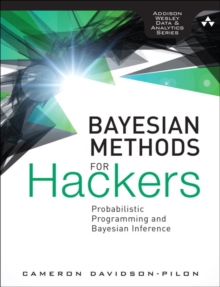Select Guide Rating
The next generation of problems will not have deterministic solutions – the solutions will be statistical that rely on mountains, or mounds, of data. Bayesian methods offer a very flexible and extendible framework to solve these types of problems. For programming students with minimal background in mathematics, this example-heavy guide emphasizes the new technologies that have allowed the inference to be abstracted from complicated underlying mathematics. Using Bayesian Methods for Hackers, students can start leveraging powerful Bayesian tools right now -- gradually deepening their theoretical knowledge while already achieving powerful results in areas ranging from marketing to finance.
Master Bayesian Inference through Practical Examples and Computation–Without Advanced Mathematical Analysis Bayesian methods of inference are deeply natural and extremely powerful. However, most discussions of Bayesian inference rely on intensely complex mathematical analyses and artificial examples, making it inaccessible to anyone without a strong mathematical background. Now, though, Cameron Davidson-Pilon introduces Bayesian inference from a computational perspective, bridging theory to practice–freeing you to get results using computing power. Bayesian Methods for Hackers illuminates Bayesian inference through probabilistic programming with the powerful PyMC language and the closely related Python tools NumPy, SciPy, and Matplotlib. Using this approach, you can reach effective solutions in small increments, without extensive mathematical intervention. Davidson-Pilon begins by introducing the concepts underlying Bayesian inference, comparing it with other techniques and guiding you through building and training your first Bayesian model. Next, he introduces PyMC through a series of detailed examples and intuitive explanations that have been refined after extensive user feedback. You’ll learn how to use the Markov Chain Monte Carlo algorithm, choose appropriate sample sizes and priors, work with loss functions, and apply Bayesian inference in domains ranging from finance to marketing. Once you’ve mastered these techniques, you’ll constantly turn to this guide for the working PyMC code you need to jumpstart future projects. Coverage includes • Learning the Bayesian “state of mind” and its practical implications • Understanding how computers perform Bayesian inference • Using the PyMC Python library to program Bayesian analyses • Building and debugging models with PyMC • Testing your model’s “goodness of fit” • Opening the “black box” of the Markov Chain Monte Carlo algorithm to see how and why it works • Leveraging the power of the “Law of Large Numbers” • Mastering key concepts, such as clustering, convergence, autocorrelation, and thinning • Using loss functions to measure an estimate’s weaknesses based on your goals and desired outcomes • Selecting appropriate priors and understanding how their influence changes with dataset size • Overcoming the “exploration versus exploitation” dilemma: deciding when “pretty good” is good enough • Using Bayesian inference to improve A/B testing • Solving data science problems when only small amounts of data are available Cameron Davidson-Pilon has worked in many areas of applied mathematics, from the evolutionary dynamics of genes and diseases to stochastic modeling of financial prices. His contributions to the open source community include lifelines, an implementation of survival analysis in Python. Educated at the University of Waterloo and at the Independent University of Moscow, he currently works with the online commerce leader Shopify.
| 

